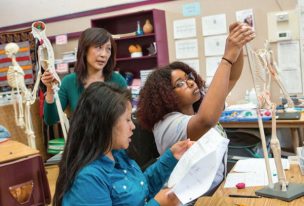What does Supportive Challenge sound like?
Updated July 20, 2021
While conversations about planning and assessment are common, our partner teachers and leaders consistently report that learning conversations involving questioning a colleague’s idea or tackling a deeper purpose together are rare. In addition, there is often a “culture of nice” surrounding professional collaboration. Trying to push a colleague to go deeper can be seen as unsupportive or asking too much, since the demands of teaching are hard enough.
How do we honor each other’s hard work and simultaneously push each other to understand how our beliefs and practices are impacting our progress towards equity? One way is to work with teachers to reframe what it means to be a caring colleague. Showing care should include offering observations and asking questions that can help colleagues expand their thinking.
What does Supportive Challenge sound like?
Supportive Challenge can be seen in these two professional conversations. In the first, elementary teachers Jaymie and Aija discuss reading partnerships in Jaymie’s first grade classroom:
J: An end goal would be that when students are reading, and they think of something, they’re able to pause and share with their partner whatever they’re thinking. But I don’t know how I’m going to get there yet.
A: If you could envision what came right after the “Did you know ____?” sentence stem, what would you like to see?
J: I guess just back and forth about the statement that that person made.
A: [Pause.] And how might you model that?
J: [Pause.] That’s a good question…I’m not sure. Because it seems like whenever I see it, it’s just happening on its own, and I don’t know how they’re doing it.
A: It sounds like a next step for you is thinking about the back and forth that you want to see and how to design a mini-lesson or instruction showing students the back and forth after the sentence stem.
Aija’s questions helped reveal a gap for Jaymie who didn’t realize she hadn’t fully visualized all of the steps of the process she wanted her students to follow.
———————————————
The second professional conversation involves computer science teachers Sam, Kendrick, and Joni. Sam was curious about how to better support his students’ problem-solving, so he video-recorded himself helping students. The three colleagues watch two short clips from his conversations with two different students, Myleah and Alex, and then discuss.
K: One thing I noticed in the videos is Alex had a longer session with Sam.
S: Well, Myleah described the problem so well I knew she knew how to fix it. So I turned the recording off and just said, “Go fix it.”
J: What about with Alex?
S: With Alex, I’ve been confused about his process, what he does to try to solve a problem. So I helped him understand the problem.
K: Did you think you ended up helping him understand the problem?
S: [Pause.] I think so. I mean…I, well I can see I talked a lot more with him than with Myleah. I didn’t really understand what he was trying to do, so I just gave him that suggestion of what to move where. [Pause.] I guess I just gave him part of the answer so he could move on.
J: What do you ultimately want Alex to do when he gets stuck
S: I want him to have some strategies for moving forward on his own, but I’m talking too much. [Pause.] OK, now I’m thinking I need to figure out what strategies would help struggling students move forward on their own without me telling them how to move forward and robbing them of their thinking.
Joni and Kendrick’s questions helped reveal a blind spot for Sam; he hadn’t realized that he wasn’t letting all students have a chance to solve the problems on their own.
Learn more about Supportive Challenge:
- Supportive Challenge and Public Learning: Transforming Systems from Compliance to Curiosity
- A recorded session for the 2021 Carnegie Foundations for the Advancement of Teaching Summit will share the partnership between West Contra Costa School District’s Secondary Principal Network and the professional learning organization Lead by Learning that together consciously attended to the cultural conditions necessary to allow the system to surface and challenge unconscious bias using the practices of Public Learning and Supportive Challenge. These efforts led to a deepened adult learning culture and more equitable outcomes for students. The presentation features Jennifer Ahn, Director of Network Partnerships and Nina Portugal, Program Associate of Lead by Learning as well as Secondary Principal Jarod Scott, Kennedy High School, and his colleagues in the West Contra Costa School District Secondary Principal Network.
- Celebrating Supportive Challenge
- Blog by Oakland Unified School District Expanded Learning leader Priscilla Parchia about her experience with Supportive Challenge and celebrating its importance in Expanded Learning.

